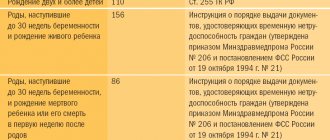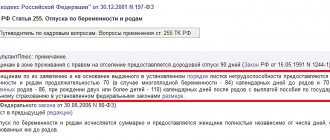The procedure for returning to your previous place of work according to the laws of the Russian Federation
Returning to work after maternity leave, according to the Labor Code of the Russian Federation, is carried out at the end of such leave or at the request of the employee. The employer does not have the right to prevent the employee from leaving or not to hire the employee to her previous place.
Legislation protects women's rights and guarantees the preservation of all previous working conditions and remuneration. The procedure for registering termination of parental leave is simple and does not require the preparation of a large number of documents.
In certain cases, the employee will not need to fill out any statements or other papers. The final registration procedure depends on the period when the employee plans to begin performing her job duties.
The procedure for leaving maternity leave and its registration
The regulatory source regulating the procedure for registering an employee’s release from leave in connection with childbirth and also for child care is the Labor Code of the Russian Federation. Based on its provisions, the employer is obliged to maintain the job of such an employee and does not have the right to dismiss or lay him off.
As previously mentioned, an employee can terminate the granted leave upon the arrival of the period specified in the order for granting maternity leave, as well as ahead of schedule. In the case when a woman returns to her workplace after the expiration of all previously granted maternity leave, no additional documents are required.
To end maternity leave, a woman must simply appear at her workplace and begin performing her immediate duties.
When leaving a vacation earlier than the deadline specified by the employer in his order, an additional application is required. After receiving it, the employer must issue an order that the leave granted to the woman is terminated.
Remember, when all employees who worked while a woman was on maternity leave in a similar position received a salary increase, the woman’s income should also be increased. This provision is provided in accordance with paragraph 16 of Government Decree No. 922 of December 24, 2007.
How to calculate the end date of maternity leave?
To calculate the end date of parental leave, the interested person should decide when exactly the end of the leave is planned:
- ahead of schedule If a maternity leaver plans to interrupt her vacation prematurely, she will have to draw up a statement and notify the employer in advance. There is no strict definition of the timing of notification to management, but it is advisable to notify the administration of the enterprise;
- up to 1.5 years of child care . Labor activity is carried out immediately after the child reaches 1.5 years of age;
- up to 3 years . The employee returns to her previous position after the child reaches 3 years of age.
No special calculation should be made, since the period for going to work is always determined by the age of the child.
How to apply correctly?
An employee who is on maternity leave often faces the question of how to formalize her return to work after maternity leave for up to 3 years.
Expert opinion
Davydov Alexander Yurievich
Civil law consultant with 20 years of practice. Author of numerous articles on legal topics
Two registration options are possible, depending on the period when the maternity leave decides to return to her work duties:
- the next day after the child reaches three years of age. In the event that such a date for going to work falls on a weekend or holiday, the start of work is carried out on the first working day after their end;
- If the employee decides to terminate her vacation early, then she should act according to the instructions:
- warning the employer in advance. Despite the absence of such an obligation, it is advisable to notify management of the decision to begin performing labor functions;
- drawing up an application for voluntary termination of leave and resumption of work.
Based on the application from the interested person, the employer issues an appropriate order. This is the basis for starting to perform work duties.
How to return to work after maternity leave
In general cases, there should be no difficulties with how to formalize exit from maternity leave when the child reaches three years of age. The employee(s) simply goes to work the next working day after the child's third birthday.
It’s another matter if there is an early exit from vacation. In this case:
- the employee(s) must submit an application and report that from a certain date he will interrupt his UzR leave and go to work;
- the employer, based on this application, issues an appropriate order.
There is no statutory period during which the employer must prepare a workplace for an employee returning from maternity leave. In Part 2 of Art. 256 of the Labor Code of the Russian Federation states that UzR leave can be used either in full or in parts, and there is not a word that the employer must be notified in advance to prepare the workplace. So it is better to spell out this unclear situation in a local regulatory document in order to preliminarily resolve all controversial issues regarding personnel records.
A temporary worker hired to replace an employee on maternity leave is dismissed on the day when the person on maternity leave returns to his workplace (part 3 of article 79 and clause 2 of part 1 of article 77 of the Labor Code of the Russian Federation). An employee’s departure from maternity leave can occur on the day of filing the appropriate application for early termination of leave, if so desired.
Experts from the reference and legal system “ConsultantPlus” spoke in a ready-made solution about how to fire a temporary worker. To view, sign up for a free trial access to the system.
The situation is different with early exit from leave under the BiR. In this case, consent to interruption of vacation from the employer is required. And in general, such a practice of interrupting vacation under the BiR is not welcome due to the need to reimburse benefits paid in advance.
Is it possible to leave early?
The law allows an employee to leave maternity leave early at any time. To do this, she should notify the employer, but the period of notification is not strictly regulated by law today. That is why the employee does not have to complete or prepare additional documents.
In addition, the employee has the right to work part-time. In this case, she retains maternity pay and earnings for the time actually worked.
The following documentation should be followed:
- drawing up an application;
- issuance of an order;
- inclusion of an additional agreement to the contract.
The listed documents contain the following information:
- date of termination of maternity leave;
- the number of hours the employee will work;
- days of the week on which the employee will work;
- amount of remuneration, tariff.
The calculation of the final amount of earnings is based on the hours actually worked and the tariff. As a result, exit from maternity leave is carried out after its end. However, you can return to work early if such a need or desire arises.
This does not require any additional action from the employee. It is advisable for her to warn the employer, but there are no strict legal requirements in this regard. The management of the organization does not have the right to reduce earnings or refuse to provide a position previously occupied.
According to existing legislation, not only the mother, but also the father and other relatives can care for a child until he reaches three years of age. Maternity leave can be used in its entirety or in parts; the nuances of its design will vary.
How does the Labor Code regulate the issue?
While an employee is on maternity leave, the following could happen:
- the position was taken by a temporary employee whom the employer does not want to transfer to another position or dismiss;
- the division in which the employee worked before the maternity leave ceased to exist, that is, the staff was reduced, but the entire enterprise was not liquidated;
- the company was liquidated.
When a company is liquidated, any employee can be fired, including those on maternity leave. However, in all other cases, an employee on maternity leave cannot be fired. This rule is enshrined in Part 6 of Art. 81 Labor Code of the Russian Federation.
To transfer an employee who has returned from maternity leave to a new position or another job, his voluntary consent is required. Otherwise, he should be given his previous position. Dismissal can only be made for disciplinary violations.
At the same time, employees often forget that, by virtue of Art. 72.1 of the Labor Code of the Russian Federation, the employer can transfer them to another workplace in another unit in the same area. The main thing here is that the terms of the employment contract do not change. Employers take advantage of this condition if another permanent employee returns to work during maternity leave.
Let me give you an example from practice: before going on maternity leave, a woman worked as an administrator in a private medical clinic, which had two divisions located in two different buildings. After the child turned 3 years old, the woman decided to go to work.
The employer refused to give her her previous job, but offered her a job as an administrator in a nearby dental department. The woman didn’t want to work there: she didn’t like the fact that she would have to work with money.
Expert opinion
Davydov Alexander Yurievich
Civil law consultant with 20 years of practice. Author of numerous articles on legal topics
Since she did not show up for work, her employer fired her for absenteeism. The court recognized this as legal (see the decision of the Borovsky District Court of the Kaluga Court of January 30, 2021 in case No. 2-113/2019).
If at the time of maternity leave the position was reduced, then, according to Art. 81 of the Labor Code of the Russian Federation, the employee must be offered another job available to the employer, even if it is paid less.
If he does not agree, he may be fired, and the employer, as in the case of liquidation of the company, must pay his former employee severance pay and support him financially during his employment.
Remember - when an employee returns from maternity leave, the employer cannot:
- not provide him with his previous job;
- transfer to another position without obtaining prior consent;
- suddenly and out of turn to recertify an employee returning from maternity leave.
If the employer cannot immediately provide the previous workplace, he must pay for the downtime. It is important here that the employee who has returned from maternity leave is at the enterprise or office during working hours. Absence may be counted as absenteeism and result in dismissal.
In case of possible difficulties and obstacles on the part of the employer, you can file a complaint against him with the labor inspectorate. The regulatory authorities are on the side of the employee, so the employer will receive a warning about the need to comply with the requirement of the law or a fine under Art. 5.27 Code of Administrative Offenses of the Russian Federation. A fine can be imposed both on the company itself and on the director personally.
In practice, there may be no settlement if the company is subject to bankruptcy proceedings and there is no money in the accounts. But even in this case, debts to employees must be repaid over time.
When is a woman required to report to the workplace after maternity leave?
It is prohibited to exceed the period of maternity leave established by law. That is, you need to go to work on the next calendar day after maternity leave or one of its parts ends.
- If it is maternity leave, you must report to work the next day after your sick leave ends. This date is indicated in the certificate of incapacity for work and the order for the provision of leave.
- If this is parental leave, then the day of leave will be the day following the child’s one-and-a-half or three-year birthday. This date is also indicated in the vacation order.
Returning from maternity leave early
Labor legislation contains a rule according to which, in order for a woman to receive maternity leave, she must provide a certificate of incapacity for work issued by the medical organization in which she is registered.
After this, the organization’s personnel service issues an order, according to which the woman is sent on maternity leave. It is necessary to pay attention to the fact that the employee must be familiar with the order. The fact of familiarization with the document must be confirmed by her signature.
After this, as a general rule, the woman returns to performing her work duties after the end of her vacation.
However, often the employee decides to return to work early.
The following circumstances may serve as grounds for early return to duty:
- The application for maternity leave was carried out by the woman’s husband.
- The presence of non-working close relatives (grandparents) in the family.
Regardless of what was the reason for leaving maternity leave early, the employer is obliged to provide the employee with the workplace and position that she previously occupied.
In this case, the employee must submit an application to the head of the organization in which she performed her labor function before the leave.
The application form is not established at the legislative level, but there is a mandatory list of information that must be included in such a document.
The application must indicate:
- name of company;
- information about the head of the organization;
- information about the employee submitting the application, including position and department;
- the desire to begin performing labor functions, indicating the exact date when the woman is ready to start work.
After receiving such a document, the head of the organization must issue an order on the possibility of the woman leaving maternity leave early. The employee must be familiar with the issued order. The fact of familiarization is confirmed by the woman’s signature.
It should be noted that the legislator has not invented a prescribed form for such an order, but it must contain information that a particular employee is beginning to perform her job function in connection with early departure from leave granted to care for a child.
How are labor relations formalized after a break to care for a child?
An employee who plans to leave early must write a statement on the basis of which the employer will form an order for the employee to leave maternity leave.
- Full name of the employee and position held;
- date of return to work;
- link to the application;
- desired work schedule;
- signatures and date of compilation.
- information about the last day of vacation according to the BIR;
- salary amount.
After preparing the order, you can return to work.
What to do if you have no intention of working after 3 years?
If, after the end of maternity leave, there is no desire or opportunity to begin your work duties, there are two options for the development of the situation:
- Dismissal. To do this, you need to write a letter of resignation of your own free will, citing family circumstances as the reason. This must be done 2 weeks before the end date of the maternity leave.
- Registration of leave without pay. If you need to extend it for a while, but there is no desire to quit, and the employer agrees, then leave at your own expense is provided upon application, which indicates its start and end dates. And in this case, the reason can be cited as family circumstances.
You can also use days of unspent regular vacation as a temporary measure.
In consultation with your superiors, consider options for part-time work or remote work. In some positions, it is possible to combine working from home and raising a child; to do this, you need to conclude an additional agreement that will spell out the conditions: schedule, number of hours worked per week, salary.
Often, women who quit after maternity leave work from home as web designers, copywriters, make websites to order, eventually registering their activities as individual entrepreneurship or working as freelancers.
Returning after maternity leave is usually not accompanied by difficulties. You just need to begin your duties on time.
In a situation of early return to work, the procedure changes somewhat - you need to submit an application, and the employer will be obliged to provide a workplace. If there is no desire to continue working, you don’t have to work, but after the child turns 3 years old, you will have to rely only on yourself in terms of salary.
Motherhood is a wonderful time for a woman, and our state strives in every way to provide support for everyone. This is especially true for working mothers.
Labor legislation has absolutely clear regulations on the registration of maternity leave for a child, as well as exit from it. But it is worth noting that any employee who is absent from the workplace due to temporary disability has the right to return before the maximum period established by law.
In this article we will look at how to formalize exit after maternity leave in accordance with existing legislation.
Legal status on maternity leave
Labor legislation provides for the right of any citizen (not just women) to apply for maternity leave until the child is one and a half and three years old. This right comes immediately after the end of the period of temporary disability due to pregnancy and childbirth.
It should be taken into account that this type of absence from the workplace is interpreted as a period of incapacity, that is, a period when a citizen, for objective reasons, cannot fulfill his work duties. This means that absence from work due to temporary disability does not in any way affect the labor relationship between employer and employee:
- To leave the job, the employee does not need to provide any additional documents or statements. You just need to show up at your workplace on the day established by law.
- The period of return to work depends on the duration initially specified in the application provided by the employee. Regulatory legal acts establish that, at her own discretion, an employee has the right to take leave to care for a child up to one and a half years old and subsequently extend it until the child is three years old.
- An employer does not have the right to dismiss an employee or transfer her to another position during her absence due to temporary disability. During the employee’s absence, the employer has the right to hire another employee for a temporary position until the end of this period.
Pregnant women and employees with children have a special position compared to other employees. This is due to the fact that the state provides such citizens with a certain preferential status, which they can use in the workplace.
Returning to work after finishing maternity leave
To begin with, let’s take a tour of history, or, more simply put, let’s remember how this period of work was formalized. The expectant mother provided the employer with a certificate of incapacity for work, according to which maternity leave was issued. At the end of this period, the maternity leaver wrote a statement. Based on the facts presented, the management of the enterprise issued an order to grant the employee maternity leave for up to 1.5 years, and then, possibly, until the baby is three years old. If a woman expressed a desire to use both types (up to 1.5 years and up to 3 years), then, accordingly, two orders with specific dates were issued in this regard.
Why did we remember the whole story? In order to reach the date in the issued order. It is the day following the end date of maternity leave reflected in the order that is the first day the employee goes to work after the end of maternity leave. No additional documents are required. The employee begins her previously performed work duties.
Returning to work during maternity leave
In accordance with the Labor Code of the Russian Federation, an employee can leave maternity leave before its end. In this case, the employee’s wishes are taken into account. The work environment and the employer's opinion do not matter. The law in this case is on the woman’s side and gives her the right to choose.
In order for an employee to begin fulfilling her work obligations upon early termination of maternity leave, she must notify the employer by writing a statement. The application is written in free form, indicating the desire to start work and the start date of work. Based on this statement, the head of the organization issues an order to stop the rest and start work for the returning employee. This is necessary in order to adjust an existing order by changing the dates. The employee must familiarize herself with this document within three days and confirm this with her signature.
In addition to the right to early leave from maternity leave, a woman has a choice regarding her work schedule. In accordance with Article 256 of the Labor Code of the Russian Federation, if an employee leaves early, she has the right to part-time work or to work from home. In this case, only her desire is taken into account. The opinion of the party providing her with work does not matter. If such a desire or need exists, they must also be reported to the employer in the submitted application. And the subsequent order will have corresponding content.
Before going to work part-time, an additional agreement is concluded between the employee and the employer to the existing employment contract. It must reflect the conditions of this cooperation: term, duration of the shift, length of the working week, work and rest hours, wages.
Protecting the interests of the mother while working part-time, the law reserved her the right to receive child benefits. If the employee returns from full-time maternity leave, then in this case the statutory payment of child care benefits is terminated.
Another nuance that a woman on maternity leave needs to know. Regardless of when the employee decided to return to work and what work schedule she chose, the employer is obliged to provide her with the position from which she went on maternity leave. References to production needs, changes in management, etc. are not acceptable. Otherwise, the disadvantaged employee may file a complaint with the labor inspectorate.
Also, if a woman is on maternity leave, she does not have the right to be laid off, transferred to another position, or fired. An employee who will perform her job duties can be hired in her place only during maternity leave. In this case, they do not have the right to register the employee on a permanent basis. When a maternity leave worker returns to work, the employee replacing her quits, and the workplace is given to the previous employee.
Early return of an employee to the workplace from maternity leave
The legislation establishes the maximum period for a citizen to be on maternity leave, but there are no restrictions on going back to work early or interrupting this period. Therefore, if an employee decides to go to his workplace earlier than the deadline, the employer is obliged to comply with the following legal norms regulated for this case:
- Request an application from the employee for early termination of the period of temporary disability. This is due to the fact that the employer must have a document confirming this fact in order to terminate the payment of benefits.
- Draw up an order based on the received application for the employee to leave parental leave early. The application is drawn up for internal personnel records of the organization and is drawn up taking into account internal document flow standards.;
- Prepare a workplace for the returning employee. At the same time, the law does not establish a deadline for preparing an employee to leave ahead of time, so this situation should be discussed on an individual basis.
- An employee who temporarily performed duties must be transferred to another vacant position or dismissed on the day the employee returns from maternity leave.
The employee has the right to decide for himself when to return to the workplace. The legislation regulates only the maximum period, which expires when the child turns 1.5 years old or 3 years old.
In this case, the registration of early exit must take place in order to terminate the payment of benefits, as well as documentation, so that there are no subsequent disagreements.
Returning from maternity leave for part-time work
When can you return from maternity leave to work part-time?
The norm of part 3 of Art. 256 of the Labor Code of the Russian Federation establishes the rule according to which a woman on maternity leave can perform a labor function on a part-time basis. Additionally, labor legislation provides her with the opportunity to work from home.
If a woman would like to work part-time, she must sign an additional agreement with the employer to the previously concluded employment agreement.
Such a document must necessarily include the following information:
- name of the organization, including information about the director;
- information about the employee indicating her position and department;
- the length of her working day;
- length of the working week;
- work and rest schedules;
- information about wages while performing part-time duties.
Please note that wages based on Art. 93 of the Labor Code of the Russian Federation must be paid in accordance with the time actually worked or in proportion to the amount of work that was performed during a part-time working day.
Frequently asked questions and answers
Question No. 1. When going on a new maternity leave without completing the previous one, is it necessary to write a statement about its interruption?
To apply for maternity leave in a situation where the employee is still on maternity leave, she needs to notify the employer with a statement. The statement voices a request to interrupt parental leave for up to 1.5 or 3 years and provide maternity leave with all appropriate payments.
The application must be accompanied by a certificate of incapacity for work, drawn up by the attending physician and certified by a medical institution.
Question No. 2. Does an employer have the right to change the terms of an employment contract for an employee when he is on maternity leave?
Expert opinion
Davydov Alexander Yurievich
Civil law consultant with 20 years of practice. Author of numerous articles on legal topics
This situation is a serious violation of labor laws if these changes occur without the knowledge of the employee. An employee has the right to appeal to the labor inspectorate if these changes violate his rights.
In any case, any actions related to changes in the workplace must be formalized with the personal consent of the employee.
Deadline for leaving maternity leave
Three years is exactly how long maternity leave lasts, according to the majority of our citizens. This is not entirely true. A woman must return from maternity leave after the child turns three years old (Article 256 of the Labor Code of the Russian Federation).
And the vacation period itself begins not at the moment of the birth of the child, but a little later - 70 days after the birth. And in the case of a complicated pregnancy, this period is extended by 86 days (by 110 days in case of multiple pregnancy).
So when do you still need to go on vacation? The exact date of leaving maternity leave is a fairly common subject of dispute between the employer and the employee.
Managers periodically insist that children need to go to work on the day the child turns three. The employee has every right to challenge this position.
The problem with the date of leaving maternity leave arises because the Labor Code (it regulates all the rights and obligations of a maternity leave) states this: maternity leave is granted until the child reaches three years of age.
A number of employers take this norm literally: your child is three years old - go to work. The employee can prove the opposite - she has the right to leave maternity leave the day after the child’s third birthday. The law is on her side, and here's why:
- Any leave is possible only at the request of the employee. The decree is no exception. The employee writes a statement indicating the start and end date of the vacation period. She will have to go to work the next day after the date specified in the application. The employer has no right to demand an earlier exit.
- The date of return to work is considered to be the day following the end of the vacation period. And even though the Labor Code of the Russian Federation does not contain a direct indication of this statement (regarding maternity leave), in our country the following rules apply - the analogy of law and the analogy of law. And in this case, the period for leaving maternity leave is calculated by analogy. If the legislative norm does not contain the exact timing of an event, then the date of its end is adopted by analogy with situations that are similar in content and meaning.
- The calculation of deadlines is described in Art. 14 Labor Code of the Russian Federation. This standard strictly states that the end of rights and obligations occurs the next day after the calendar date of the end of a specific employment relationship. Maternity leave is a direct labor relationship. And in any working relationships and labor regulations (including issues of when to start work after the end of the maternity period), the employer must be guided by the provisions of the Labor Code of the Russian Federation.
In this case, the law and logic are on the employee’s side—the exit from maternity leave is postponed to the day following the child’s third birthday. If your employer has a different point of view, a lawyer can help you. A competent labor relations specialist will explain to your manager the current legal regulations and how to read and apply them.
You also don’t have to file a leave of absence or fill out an additional application. There is an initial application and order (with a start and end date), these documents are the basis for starting work when maternity leave ends.
But if the employer draws up an order to return to work and asks you to sign it, this will not be a violation - calmly sign the document and get to work.
Standard term for leaving maternity leave
Deadline for leaving maternity leave
Labor law standards allow an employee on maternity leave to begin working at any time when the latter has the need and opportunity to do so.
It must be recalled that maternity leave is leave granted to a woman for:
- childbirth;
- caring for a child under 1.5 years of age;
- caring for a child under 3 years of age.
Leave related to the birth of an employee is granted for a period of 140 days. In exceptional cases, this period of time may be extended based on a medical opinion. Leave is granted on the basis of a certificate of incapacity for work. A woman must go to work the day after the day indicated in the medical document.
In the case where a woman has taken leave to care for a baby up to 1.5 or 3 years old, the day on which the employee must start work is considered the next day after the baby reaches 1.5 or 3 years old, respectively.
What to do if you can’t go to work after maternity leave
If for some subjective reason an employee cannot go to work on time (after the child turns 3 years old), for example, he was unable to get a place in a kindergarten, he can:
- Apply for leave without pay. After submitting the application, the employer makes a decision to refuse or grant such leave.
- Ask the employer to transfer to home work or change the work schedule by switching to part-time work. And in this case, everything will depend on the goodwill of the employer, with the exception of the situations listed in Art. 93 Labor Code of the Russian Federation.
In the event that the head of the company does not agree with the request to change the work schedule or grant the next vacation, absence from work after the end of the UzR vacation will be regarded as absenteeism with all the ensuing disciplinary consequences (Clause 6a, Part 1, Article 81 of the Labor Code of the Russian Federation) .
If an agreement is reached between the employer and employee to change the work schedule, an additional agreement will need to be concluded. agreement to the employment contract on the basis of Art. 72 Labor Code of the Russian Federation. It will also be necessary to make a number of changes to internal documentation if records are kept somewhere of part-time employees.
How to go back to work after maternity leave
When to go to work
First, let's figure out what maternity leave is and what it is eaten with. According to the Labor Code of the Russian Federation (Articles 255 and 256), the entire period, which we simply call “maternity leave,” consists of two parts.
- The first is maternity leave. Provided for a period of 140 to 194 days, depending on the course of pregnancy. In fact, this is an analogue of sick leave.
- The second is parental leave for up to three years. Moreover, benefits are accrued up to one and a half years, but after one and a half years they are not accrued. This leave can be used not only by the mother, but also by the father and grandparents of the child (if they actually care for the child).
You can go to work any day, having notified the employer in advance with a corresponding statement, and do not wait until the child turns three years old.
And you are required to go to work the day after you celebrate your child’s third birthday. From this day on, the vacation ends; failure to show up for work will be considered absenteeism.
Can you be fired?
Someone is afraid to go to work because they don’t want to be separated from their child. And someone is worried that on the first day after maternity leave they will receive a work book in their hands.
An employer cannot fire you during maternity leave until the organization itself is liquidated.
If you went to work earlier and your child is not yet three years old, you are also relatively safe. According to Article 261 of the Labor Code of the Russian Federation, an employer can terminate employment relations with you on its own initiative if the organization is being liquidated or if you have grossly violated labor discipline.
But when the child has reached three years of age, the employer can fire you even the next day (exceptions are single parents, breadwinners of large families and parents of disabled children).
Only women who have entered into a fixed-term employment contract need to worry. If it has ended, you may receive a notice of termination. The employer is obliged to extend the term of the contract only for the duration of pregnancy, but not for the period of maternity leave.
How to get to work and stay there
From the manager’s point of view, the situation with the mother who came after maternity leave is ambiguous. An employee who worked in the required position for three years got used to it and showed his best side, while the employee, after a long break, still needs to restore her skills and get into the working rhythm. According to the law, a new position cannot be given to a “maternity leaver”; the mother returns to the same job from which she went on vacation. In addition, everyone is afraid that young mothers will more often disappear on sick leave and ask for time off to attend matinees.
What does this mean? That you will have to get to your workplace in advance and talk with your boss, and not wait until the end of your vacation.
Indicate your desire to return to work and defense, talk about the conditions under which you will start working again. Perhaps after such a conversation you will draw conclusions whether it’s worth getting your office suit out of the closet or whether it’s time to update your resume and look for a new job.
Find out what has changed in the workplace while you were away. Who came to the team, which of the old people stayed in their place, who received a promotion. Ask how the organization is doing: is it planning to expand, enter new markets, or, conversely, is there a period of austerity ahead on everything.
Read professional literature. This is useful in order not to miss important information and to keep the brain functioning in working mode.
Look for professional communities, watch videos. This way you can keep your finger on the pulse of your field.
How to prepare for the new regime
If after your child’s third birthday you take him to kindergarten for the first time, and you cheerfully run to work, everything will be bad, really. A week after the abrupt start of the new regime, a disaster awaits you: the house is a mess, the child is upset, you are squeezed like lemon, you are unhappy at work. Prepare your body and family for changes before they hit you.
Solve the issue with the kindergarten and nanny in advance. The child will need to get used to the new environment and routine. In 99.9% of cases, morning tears await you. Prepare your child for new circumstances and spend more time with him in the mornings and evenings.
Get up earlier. If you used to get ready for work, say, in 15 minutes, but you can get your child ready in 30 minutes, then the formula for calculating the time will be: (15 + 30) × 2. And this is also the minimum margin. You will always have something going on that might cause you to be late. Because the law of meanness works without interruption.
Distribute responsibilities. Parental leave usually includes taking care of the house. Now you won't have enough time to do everything at once. Ask for help and distribute responsibilities among family members so you don't go crazy with the workload.
Put off new tasks for later. If the new regime is difficult, no one even thinks about additional activity. But sometimes women experience a frantic surge of strength. Finally, there is so much to do! There is a desire to visit all the exhibitions, go to training or foreign language courses every day. Especially if during maternity leave you were completely focused on maternal affairs.
The body's resources are not infinite, you will fly and flutter for a couple of months, and then you will be so tired that you will not even have the strength to do what is necessary.
In this situation, the principle “if you drive more quietly, you will go further” is revealed in all its glory. Do you want to move mountains? Roll up, but gradually. First, learn to distribute time between home and work, and when you feel that there is a lot of energy left, look for a use for it.
How to behave at work
After a long break, going back to work feels like entering another world. You will be afraid and worried about the quality of your work and your knowledge. Try to calm down. You return to the same place of work you left. You have already started working in this organization once. And nothing terrible will happen to you.
Ask questions and don't be afraid to show that you don't know something. It’s better to ask and do it right than to redo it later. And the more questions you ask, the faster you will catch up with your colleagues.
Learn to remain silent about personal things. Everyone talks about what worries them, and you will worry about the child.
I remind you. To the question “How are you?” you need to answer: “Thank you, good! What about you?". And don’t tell us how you really are doing.
Don’t tell every colleague the details of your family life; not everyone is interested in hearing when your child took his first steps (to be honest, almost no one is interested in this).
Follow the dress code . Even if the company wears casual clothing, a business-like look will help set you up for productivity.
What to do if there is no one to leave your child with?
The reality is that not everyone is lucky enough to have kindergarten even by the age of three. Sometimes there is no one to leave the child with, or a ticket to a preschool institution will appear in a few months, but you need to go to work. Unfortunately, there are few options in this situation:
- Look for a nanny.
- Negotiate with the employer about the possibility of remote work.
- Write an application for unpaid leave for the required time.
You can start working before the end of your maternity leave on a part-time basis. Of course, you need to agree on the issue with the employer.
You will only have to rely on good relations with your superiors and your value to the company. So all the tips given above are quite suitable in your case.
And we won’t go to work!
What to do if you are not going to work? Typically, women who were on maternity leave are concerned about the exact opposite question. Therefore, those who decided for some reason to postpone hard work find themselves left behind.
How to part with work correctly? Try to maintain warm relationships at work. What if you decide to return?
The most professional solution would be to announce your intention in advance so that the employer can prepare and find a replacement for the employee. Or didn’t kick out the one who already works in your place.
Deliver the news personally . On the one hand, everything with us is entirely paper-based, and by law you can communicate with your employer exclusively through applications and Russian Post. Moreover, you are required to notify your decision to leave your position in writing. But it is humanly important that a conversation be attached to the letter and application. A personal conversation is not always possible (for example, you have moved or you have no one to leave your child with), but at least call.
Count your payments . If you decide to quit after maternity leave, make sure that you are paid all compensation if you did not go on leave before going on maternity leave. Moreover, the first part of the maternity leave (maternity leave) is included in the vacation period, the rest are not.
Banish the feeling of guilt . If it seems to you that you are letting someone down with your decision, that the work cannot be done without you, it seems to you. While you were on maternity leave, everything functioned without your presence; your dismissal will not destroy the organization.
Dismissal after maternity leave
Expert opinion
Davydov Alexander Yurievich
Civil law consultant with 20 years of practice. Author of numerous articles on legal topics
The employer should keep in mind that, on the basis of Part 4 of Art. 261 of the Labor Code of the Russian Federation, he will not be able to dismiss the following employees after the end of maternity leave:
- single mothers (fathers) with children under 14 years of age or disabled children under 18 years of age;
- the only breadwinners in a family where there is a disabled child under 18 years of age.
There are also situations when an employer wants to fire an employee returning from maternity leave at all costs. For this purpose, he decides to conduct a certification, supposedly then he will be able to part with the employee due to the identification of a discrepancy between his qualifications and the position held.
- According to Part 3 of Art. 81 of the Labor Code of the Russian Federation, dismissal for the above reason is possible only if it turns out to be impossible to transfer such an employee to another position with reduced qualification requirements with his consent.
- In addition, the rights of an employee (a single mother with a child under 14 years old, a father raising a child without a mother, parents of a disabled child under 18 years old, a breadwinner with a large family, etc.) are protected from dismissal at the initiative of the employer, Art. 261 Labor Code of the Russian Federation.
It is also important that in relation to teaching staff, their certification is unacceptable for 2 years after leaving maternity leave (clause 22 of the order of the Ministry of Education and Science of Russia dated 04/07/2014 No. 276).
Certification of employees employed in the branches of the Pension Fund is allowed only one year after the end of the UzR vacation (clause 1.2 of the resolution of the board of the Pension Fund of Russia dated January 15, 2007 No. 5p).
If suddenly the head of a private company decides to organize an attestation test of the qualifications of an employee who has returned from maternity leave and, based on its results, decides to dismiss, there is a high probability that the dismissed employee will be able to be reinstated in his position through the court.
According to the general rules, an employee’s exit after maternity leave does not require any special documentation, with the exception of cases of early exit (then the employee submits an application and the employer issues an order). Based on Art.
255–256 of the Labor Code of the Russian Federation, the employer retains the employee’s position during maternity leave, so after vacation the employee returns to his previous workplace.
The return of a happy mother to her old workplace after maternity leave in most cases is carried out without the need to notify the employer about this fact. The procedure for entering the service itself can be formalized in different ways. It all depends on the reason for the woman’s return to her job duties and the type of leave.
Returning to your old job after maternity leave at the request of a young mother is permitted by Russian law at any time. A woman has the right to interrupt leave for BiR (pregnancy and childbirth), UzR (to care for a child up to 3 years old) when she needs it.
Also, returning to your old position may be planned. Most often this happens when the baby reaches three or one and a half years.
Let's look at a simple example. The employee submitted a statement that she plans to return to the workplace after her baby turns 1.5 years old.
The child was born on October 6, 2016. In accordance with the application, she must return from vacation on 04/07/2018.
The law allows mommy to change her mind. If for some reason she decides to extend her vacation until the third birthday of the newborn, she just needs to write a new application on 04/07/2018.
Then she will return to her previous duty station on 10/07/2019.
If you plan to leave maternity leave after the baby turns 3 years old, the company’s HR department does not formalize this fact in any additional way. The woman simply begins to perform her professional duties.
She starts working the day after her baby turns 3 years old. An employee temporarily hired for her position is dismissed on the same day in accordance with Article 77 and Article 79 of the Labor Code.
When returning to work early, the situation is slightly different. The woman on maternity leave submits a corresponding application, and the employer is required to prepare an order for the employee to return from UzR leave earlier than scheduled.
On the first day of returning to work, the employee signs this document. Even more red tape can arise if mommy decides to interrupt her B&R leave.
Firstly, she will need to agree on her wishes with her employer. Secondly, the company’s accounting department will have to recalculate the pregnancy benefit paid in advance, part of which will have to be returned to a woman leaving maternity leave early.
The Labor Code describes all the features of the labor legislation of the Russian Federation, which applies to both pregnant women and young mothers. The document says that a woman only needs to present her employer with a certificate of incapacity for work issued by a gynecologist and write a statement in order to go on maternity leave.
These papers are sufficient to apply for leave for the prenatal and postpartum periods. The organization issues a maternity leave order.
Expert opinion
Davydov Alexander Yurievich
Civil law consultant with 20 years of practice. Author of numerous articles on legal topics
The woman signs it and says goodbye to the company for a while, during which her workplace remains hers (Article 256 of the Labor Code).
Exit from correctly completed planned vacations is carried out without the need to fill out special documents. There are two options here:
- 1. Return to the previous place after the end of the holiday according to BiR. Sick leave for normal childbirth is usually issued for 140 days. In case of pathologies and health problems of the mother (her baby after birth), as well as in case of multiple pregnancy, it can be extended to 194 days. When the specified time passes, the woman has the right not to take leave under UzR, but to immediately return to her job.
- 2. Exit from maternity leave. The workplace will be waiting for the employee (happy mommy) in this case too.
We have already discussed the features of early return to work above. There is nothing more to add here, except that the application for an unscheduled return to the old position is written by the employee in free form.
The law does not provide for any unified form of filling it out. The main thing is that the application indicates the date of return to service.
Sometimes a woman, for certain reasons, cannot return to work after maternity leave, although her leave to care for her child up to three years has ended. What should she do in this case? You need to write a petition to the employer asking:
- on registration of unpaid leave;
- about going part-time;
- on transfer to home-based performance of work duties.
Let’s say right away that everything here depends on the goodwill of the employer. He can satisfy mommy’s request, or he can refuse her.
In the latter case, the woman is obliged to return to work on the day she returns from vacation. If she does not do this, she will be counted as absentee.
The result is termination of the employment contract under Art. 81 TK.
In cases where the management accommodated the employee (for example, allowed her to work part-time or from home), an additional agreement is signed between her and the employer, and appropriate changes are made to the personnel documentation.
Sometimes the employer does not have time to pay for a temporary employee who occupies the position of a young mother, or is not able to provide the latter with a workplace for other reasons. What should a woman do in such situations? Be sure to go to work! Even if she does nothing within the scope of her official duties, the company will pay her a salary in the amount of 2/3 of her (average) earnings.
This is stipulated in Art. 157 TK.
If management does not allow a young mother to enter her workplace or creates other obstacles, she must file a claim with the judicial authorities. In it, the woman will demand financial compensation for the time that she was unable to work due to the fault of the organization’s management. Such cases are rare in practice. Typically, employers strive to avoid bringing cases to court.
Most often, those returning from maternity leave are offered another position. If a woman agrees to such an offer, her new working conditions are formalized in an additional agreement.
It is called a contract by agreement of the parties. Important! Mommy should not have medical contraindications to perform the new job.
Expert opinion
Davydov Alexander Yurievich
Civil law consultant with 20 years of practice. Author of numerous articles on legal topics
And, by the way, the specified add. the agreement is allowed to be signed while the maternity leave is on leave in Uzbekistan, and not precisely after her return to the enterprise.
Such situations occur when an organization finds a more qualified specialist for a temporarily free position and does not want to let him go to another company.
If a woman is not satisfied with her new job and the employer decides to fire the young mother, it will not be so easy to do so. It will be enough for her to file a complaint with the Labor Inspectorate to get her position back.
In addition, the law (Article 261 of the Labor Code) prohibits the dismissal of mothers with disabled minor children and single mothers with children under 14 years of age.
It is clear that there is little point for a woman to work in conditions of confrontation with her superiors. If the employer does not want to further cooperate with his employee, it makes sense for her to quit.
But not by choice, but strictly by staff reduction or agreement with management. Then, when she registers with the Employment Center, she will receive high unemployment benefits.
Payments will be significantly greater than in cases where an employee leaves the company of her own free will.
Any happy mother should know her rights. Then her return to work after maternity leave will bring her extremely positive emotions.
Returning to work after maternity leave is an important and difficult period in a woman’s life. The child has grown up, and the time has come to begin his professional duties.
But life is now different from what it was before the arrival of the new little person: you have new worries that are related to the baby, and not work. And this especially worries many women.
Will the employer's attitude towards an employee who now has a small child change? And will there be any difficulties when returning to your previous position? Let's figure it out.
Working after maternity leave by law
Since the legislation does not disclose what exactly falls under the definition of “maternity leave” (there is no such term in labor law), in practice this phrase refers to both “maternity” leaves: in BiR and in Uzbekistan. The conditions for leaving each type of leave are slightly different.
Let's consider both options.
Returning to work from leave under BiR
Labor leave is granted on the basis of a certificate of incapacity for work. After completing the leave, the most common duration of which is 140 days, the employee can immediately go to work without taking out the next required leave under the UzR.
In this case, the employee retains her job, because she was actually on sick leave (leave for medical reasons).
Returning to work from vacation in Uzbekistan
While an employee is on UzR leave, he is guaranteed to retain his job (position). This is stated in Part 4 of Art. 256 Labor Code of the Russian Federation. This means that, upon returning from vacation (either after the child reaches 3 years of age or ahead of schedule), the person on maternity leave begins to do the same work as before the vacation.
After leaving leave under the BiR until the child turns 3 years old, the employee can go on leave under the UzR at any time, even if she did not write a corresponding application immediately after giving birth. An employee on UzR leave cannot be fired (unless we are talking about the liquidation of the company), or transferred to another job without his consent.
All stages of registration for leaving maternity leave are discussed in detail in the ready-made K+ solution. To study this and other equally interesting materials, sign up for trial access to the system.
What to do if you can’t go to work after maternity leave
If for some subjective reason an employee cannot go to work on time (after the child turns 3 years old), for example, he was unable to get a place in a kindergarten, he can:
- Apply for leave without pay. After submitting this application, the employer makes a decision to refuse or grant leave.
- Ask the employer to transfer to home work or to change the work schedule by transferring to part-time work. And in this case, everything will depend on the will of the employer, with the exception of the situations listed in Art. 93 Labor Code of the Russian Federation.
In the event that the head of the company does not agree with the request to change the work schedule or grant the next vacation, absence from work after the end of the UzR vacation will be regarded as absenteeism with all the ensuing disciplinary consequences (Clause 6a, Part 1, Article 81 of the Labor Code of the Russian Federation) .
If an agreement is reached between the employer and employee to change the work schedule, an additional agreement will need to be concluded. agreement to the employment contract on the basis of Art. 72 Labor Code of the Russian Federation. It will also be necessary to make a number of changes to internal documentation if records are kept somewhere of part-time employees.
Subscribe to our newsletter
Yandex.Zen VKontakte Telegram
If the transfer to part-time work at the request of the employee was made on the basis of Art. 93 of the Labor Code of the Russian Federation, the employer will not need to notify the employment service about this fact (letter of the Federal Service for Labor and Employment of Russia “On the application of legislation...” dated May 17, 2011 No. 1329-6-I).
What to do if it is not possible to provide work to an employee returning from maternity leave
It is also possible that the employer was unable to provide a workplace for an employee returning from maternity leave in a timely manner, for example, he did not pay for a temporary employee or for some other reason. Then the employee returning from maternity leave is paid downtime at the rate of at least 2/3 of his average earnings (Article 157 of the Labor Code of the Russian Federation).
Important! Even if there is downtime caused by the employer, the employee must go to work, otherwise there will be no compensation for such downtime. We are talking about situations when an employee can go to work (he is not on sick leave, he is not allowed to enter the workplace, etc.), but does not do so, believing that there is nothing to do at work anyway.
If an employer artificially creates barriers to an employee’s access to his place of work, the latter has the right to go to court with a demand for payment for working hours during which he was deprived of the opportunity to work due to the employer’s fault.
In a situation where another more qualified employee is hired at the workplace, the employer can offer the employee who has returned from maternity leave a transfer to another job. If this proposal satisfies the latter (for example, the proposed place of work is closer to home or there is less responsibility in the new place), the transfer can be arranged by agreement of the parties.
Important! You can arrange a transfer to another job not only after the person on maternity leave returns to work after a leave under UzR, but also during the period of being on this leave.
This is especially true if the employee returning to work after maternity leave is a financially responsible person, because when transferring to another job after he returns to his position, it will be necessary to once again take an inventory of material assets.
With such a translation approved by both parties, it is important to take into account the absence of medical contraindications (Part 4 of Article 72.1 of the Labor Code of the Russian Federation). When transferring to another job, an additional agreement is concluded with the employee. agreement to the employment contract.










